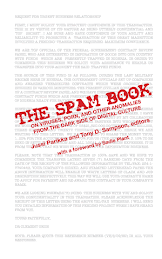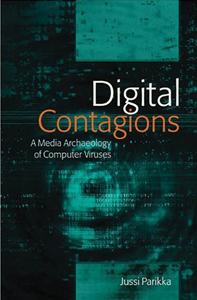 Please find below information and registration possibility for our symposium
Please find below information and registration possibility for our symposiumon new materialist cultural analysis as well as info for the launch event of the
CoDE institute and the affiliated Digital Performance Laboratory.
An International Symposium on Contemporary Arts, Media and Cultural Theory
Date: Monday 21 June 2010
Time: 10:00 - 17.30 (18.00 Performance and CoDE Launch)
Venue: Hel 201, Anglia Ruskin University, East Road, Cambridge
Far from being immaterial, digital culture consists of heterogeneous bodies, relations, intensities, movements, and modes of emergence manifested in various contexts of the arts and sciences.
This event suggests "new materialism" as a speculative concept with which to rethink materiality across diverse cultural-theoretical fields of inquiry with a particular reference to digitality in/as culture: art and media studies, social and political theorising, feminist analysis, and science and technology studies.
More specifically, the event maps ways in which the questions of process, positive difference or the new, relation, and the pervasively aesthetic character of our emergences with the world have lately been taken up in cultural theory. It will engage explorations of digital culture within which matter, the body and the social, and the long-standing theoretical dominance of symbolic mediation (or the despotism of the signifier) are currently being radically reconsidered and reconceptualised.
The talks of the event will probe media arts of digital culture, sonic environments, cinematic contexts, wireless communication, philosophy of science and a variety of further topics in order to develop a new vocabulary for understanding digital culture as a material culture.
Speakers include: Dr David M. Berry, Dr Rick Dolphijn, Dr Satinder Gill, Dr Adrian Mackenzie, Dr Stamatia Portanova, Dr Anna Powell, Dr Iris van der Tuin and Dr Eleni Ikoniadou.
The academic programme will be followed by a physical computing and dance performance involving CoDE affiliated staff (Richard Hoadley and Tom Hall) along with choreographers Jane Turner, Cheryl Frances-Hoad and their dancers.
Following the symposium there will also be a short workshop for PhD students on Tuesday 22 June led by Van der Tuin and Dolphijn along with Milla Tiainen and Jussi Parikka. The aim of the workshop is to enable students to discuss and present brief intros to their work on the theme of new materialist analysis of culture and the arts with tutoring from the workshop leaders. The workshop is restricted to max. 10 students. Participation for the selected ten is include in the registration fee. If you are interested, please send an informal message to either milla.tiainen@anglia.ac.uk or Jussi.parikka@anglia.ac.uk along with a short (approx. 1 page) description of your PhD work and its relation to new materialism.
In addition, we are planning an informal introductory workshop for Tuesday afternoon on experimental performance and physical computing.
The event is sponsored by CoDE: the Cultures of the Digital Economy research institute and the Department of English, Communication, Film and Media at Anglia Ruskin University.
Please register your place here
Fee: £20
Programme
Anglia Ruskin University. East Road, Cambridge, UK, Helmore Building, room Hel 201
June 21, Monday
10.00 Welcome and what is new materialism, Milla Tiainen and Jussi Parikka
10.15 Anna Powell (Manchester Met): Electronic Automatism: Video Affects and The Time Image
11.10 Break
11.30 Iris van der Tuin (Utrecht): A Different Starting Point, a Different Metaphysics”: Reading Bergson and Barad Diffractively
Rick Dolphijn (Utrecht): The Intense Exterior of Another Geometry
12.30 Lunch
13.45 Stamatia Portanova (Birkbeck): The materiality of the abstract (or how movement-objects ‘thrill’ the world)
Eleni Ikoniadou: Transversal digitality and the relational dynamics of a new materialism
Satinder Gill (Anglia Ruskin/CoDE and Cambridge University): “Rhythms and sense-making in responsive dense-space'
15.20 break
15.40 David Berry: Software Avidities: Latour and the Materialities of Code.
16.10 Adrian Mackenzie (Lancaster) Believing in and desiring data: R as ' next big thing
17.00 closing and a break
18.00 Open launch and drinks event for the Digital Performance laboratory (CoDE, Music and Performing Arts, Anglia Ruskin) and a science-arts interdisciplinary performance Triggered. Recital-hall, Helmore Building (029), East Road, Anglia Ruskin, Cambridge.
'Triggered' showcases the results of a practice-as-research project into methods of interdisciplinary collaboration between a group of contemporary dancers, musicians and music technologists. The nature of this collaboration has allowed performance to emerge from artists and disciplines interacting and responding to each other. The bespoke technologies used in the project enable sophisticated dialogue between movement and sound, between music composition and choreography. The nature of interaction and narratives created are key areas of investigation and these areas will explored in a workshop on the second day of the conference. Performing, choreographing, composing and building the production are Cheryl Frances-Hoad, Tom Hall, Richard Hoadley, Jane Turner & dance company.
Day 2 (June 22)
10.00-12.30 Helmore 251
New materialism: art, science, media –workshop with selected PhD students with Dr Iris van der Tuin and Rick Dolphijn, along with Milla Tiainen and Jussi Parikka
12.30-14.00 lunch
14.00 an experimental performance/HCI workshop and interaction possibility with Jane Turner, Cheryl Frances-Hoad, Dr Satinder Gill, Dr Richard Hoadley and Dr Tom Hall.








